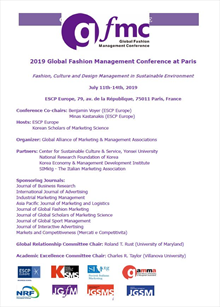간행물
Global Fashion Management Conference

- 발행기관 글로벌지식마케팅경영학회
- 자료유형 학술대회
- 간기 부정기
- ISSN 2288-825X (Print)
- 수록기간 2015 ~ 2024
- 주제분류 사회과학 > 경영학 사회과학 분류의 다른 간행물
- 십진분류KDC 325DDC 330
권호리스트/논문검색
2019 Global Fashion Management Conference at Paris (2019년 7월) 224건
181.
2019.07
구독 인증기관 무료, 개인회원 유료
Global Fashion Management Conference
2019 Global Fashion Management Conference at Paris
pp.696-699
글로벌지식마케팅경영학회
3,000원
182.
2019.07
구독 인증기관·개인회원 무료
Global Fashion Management Conference
2019 Global Fashion Management Conference at Paris
p.700
글로벌지식마케팅경영학회
183.
2019.07
구독 인증기관 무료, 개인회원 유료
Global Fashion Management Conference
2019 Global Fashion Management Conference at Paris
pp.701-704
글로벌지식마케팅경영학회
3,000원
184.
2019.07
구독 인증기관 무료, 개인회원 유료
Global Fashion Management Conference
2019 Global Fashion Management Conference at Paris
pp.705-707
글로벌지식마케팅경영학회
3,000원
185.
2019.07
구독 인증기관 무료, 개인회원 유료
Global Fashion Management Conference
2019 Global Fashion Management Conference at Paris
pp.709-711
글로벌지식마케팅경영학회
3,000원
186.
2019.07
구독 인증기관 무료, 개인회원 유료
Global Fashion Management Conference
2019 Global Fashion Management Conference at Paris
pp.712-717
글로벌지식마케팅경영학회
4,000원
187.
2019.07
구독 인증기관·개인회원 무료
Global Fashion Management Conference
2019 Global Fashion Management Conference at Paris
pp.718-719
글로벌지식마케팅경영학회
188.
2019.07
구독 인증기관·개인회원 무료
Global Fashion Management Conference
2019 Global Fashion Management Conference at Paris
pp.720-721
글로벌지식마케팅경영학회
189.
2019.07
구독 인증기관 무료, 개인회원 유료
Global Fashion Management Conference
2019 Global Fashion Management Conference at Paris
pp.722-730
글로벌지식마케팅경영학회
This research identifies the types of relationship asymmetry within sustainable fashion supply chains and the role of relationship asymmetry in sustainable product development in fashion supply chains in the UK. This research that is based on supply chain experiences of experts highlighted that how relational asymmetries hinder sustainable product development in fashion supply chains, but also how sustainable behaviours, values and policies help to overcome the influence of relational asymmetry in sustainable product development process.
4,000원
190.
2019.07
구독 인증기관 무료, 개인회원 유료
Global Fashion Management Conference
2019 Global Fashion Management Conference at Paris
pp.731-737
글로벌지식마케팅경영학회
4,000원
191.
2019.07
구독 인증기관·개인회원 무료
Global Fashion Management Conference
2019 Global Fashion Management Conference at Paris
p.738
글로벌지식마케팅경영학회
192.
2019.07
구독 인증기관·개인회원 무료
Global Fashion Management Conference
2019 Global Fashion Management Conference at Paris
p.739
글로벌지식마케팅경영학회
193.
2019.07
구독 인증기관 무료, 개인회원 유료
Global Fashion Management Conference
2019 Global Fashion Management Conference at Paris
pp.740-745
글로벌지식마케팅경영학회
The purpose of this study is to understand the impact of brand extensions. Specifically, the study examines how consumers’ perceived fit between parent brand and newly extended brands may help facilitate consumers’ post extension evaluation of parent brand equity and brand concept.
4,000원
194.
2019.07
구독 인증기관·개인회원 무료
Global Fashion Management Conference
2019 Global Fashion Management Conference at Paris
pp.746-747
글로벌지식마케팅경영학회
195.
2019.07
구독 인증기관 무료, 개인회원 유료
Global Fashion Management Conference
2019 Global Fashion Management Conference at Paris
pp.748-752
글로벌지식마케팅경영학회
The purpose is to propose and test the model for measuring the reputation of fashion brands. In order to test the model, 10 in-depth interviews with 10 Spanish Fashion CEOs and top managers were conducted. The findings validated variables: brand awareness, product and service quality, brand affect, self-congruence and sustainability and provided social networking as the new variable and removed the financial performance variable.
4,000원
196.
2019.07
구독 인증기관 무료, 개인회원 유료
Global Fashion Management Conference
2019 Global Fashion Management Conference at Paris
pp.753-756
글로벌지식마케팅경영학회
3,000원
197.
2019.07
구독 인증기관·개인회원 무료
Global Fashion Management Conference
2019 Global Fashion Management Conference at Paris
pp.757-758
글로벌지식마케팅경영학회
198.
2019.07
구독 인증기관·개인회원 무료
Global Fashion Management Conference
2019 Global Fashion Management Conference at Paris
pp.759-760
글로벌지식마케팅경영학회
199.
2019.07
구독 인증기관·개인회원 무료
Global Fashion Management Conference
2019 Global Fashion Management Conference at Paris
pp.761-762
글로벌지식마케팅경영학회
200.
2019.07
구독 인증기관 무료, 개인회원 유료
Global Fashion Management Conference
2019 Global Fashion Management Conference at Paris
pp.763-765
글로벌지식마케팅경영학회
3,000원

